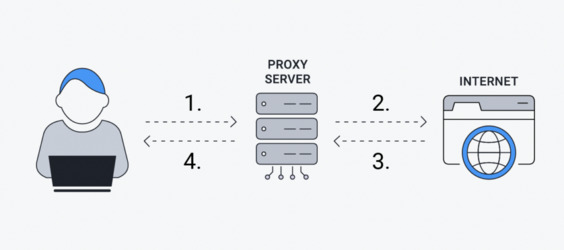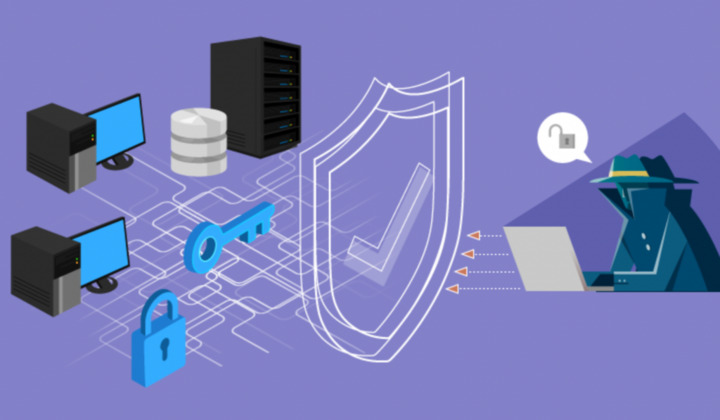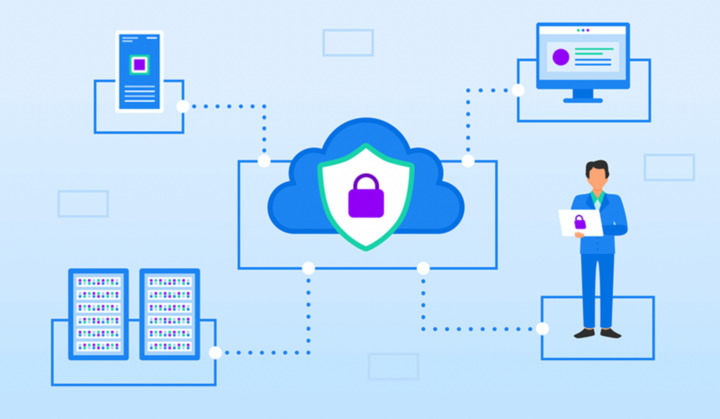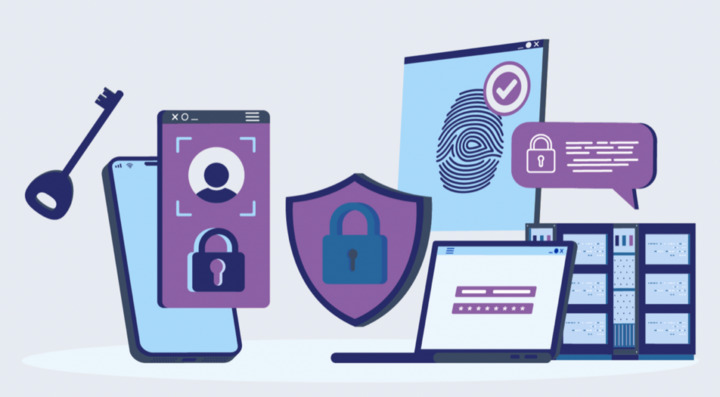How Do Proxy Server Providers Avoid Copyright Infringement Violations?

Proxy servers have become popular tools for internet users to access geo-restricted content, bypass censorship, and enhance online privacy. However, using proxy servers can raise concerns about potential copyright infringement violations, as they may be used to access copyrighted material without proper authorization. In this article, we will explore how proxy server providers can avoid infringement violations and how they ensure their services’ legal and ethical usage.
What Is Proxy Server?

It is a type of intermediary that acts as a bridge between a client (such as a computer or a device) and a server (such as a website or an online service) on the Internet. For example, when a client requests data from a server, the request first goes to the proxy server, which processes it and then forwards the request to the server on behalf of the client. Similarly, when the server sends data back to the client, it first goes to the proxy server, which then forwards it to the client.
Overview Of Copyright Laws And How They Apply To Proxy Servers

Copyright laws are legal frameworks that govern the rights of creators and owners of original works, such as writers, artists, musicians, and other creators. These laws provide exclusive rights to creators and owners, including the right to reproduce, distribute, display, and perform their works, and prohibit others from using them without proper authorization.
Bypassing Copyright Infringement Violations
Proxy servers, which act as intermediaries between users and the internet, can potentially impact copyright laws in several ways:
- Accessing Copyrighted Material
Proxy servers can access copyrighted material, such as websites, online services, or digital content, that may be subject to copyright protection. If the server is used to circumvent copyright protection measures or gain unauthorized access to copyrighted material, it may constitute copyright infringement, which is illegal and subject to civil and criminal penalties. Therefore, it’s essential to use proxy servers lawfully and ethically and obtain proper authorization before accessing copyrighted material.
- Distributing Copyrighted Material
Proxy servers can also distribute copyrighted material, for instance, by sharing or uploading copyrighted content to the internet. If using a server involves the unauthorized distribution of copyrighted material without proper authorization, it may also constitute infringement. Therefore, it’s essential to understand the rights and permissions associated with copyrighted material and comply with copyright laws when using proxy servers to distribute or share content.
Protecting Copyrighted Material
On the other hand, proxy servers can also be used to protect copyrighted material. This can be done by masking IP addresses or encrypting data traffic to prevent unauthorized access or copying. Content creators or owners often apply these measures to safeguard their works and enforce copyright rights. However, it’s vital to ensure that such usage of servers complies with applicable laws and does not involve any illegal activities, such as circumventing copyright protection measures or engaging in unauthorized distribution.
Terms of Service and Acceptable Use Policies
Many websites, online services, or networks may also have a ToS or AUP outlining their permitted uses, including proxy servers. So, it’s essential to review and comply with these terms, as violating them by misusing proxy servers may result in consequences such as termination of service, loss of access, or legal action.
Why It Is Important to Avoid Copyright Infringement Violation

There are multiple reasons why it is important to avoid infringement violations.
- From a legal perspective, copyright infringement is a violation of the exclusive rights of a copyright holder, which can result in legal consequences, including civil lawsuits and financial penalties. Furthermore, proxy providers can face legal liability if their services are used to access copyrighted content without proper authorization.
- Ethically, avoiding infringement is crucial to respect the rights of content creators and protect their intellectual property. Unauthorized access to copyrighted material through proxies can harm the revenue streams of content creators, disrupt legitimate business models, and undermine the integrity of intellectual property rights.
- Moreover, avoiding copyright infringement is essential to maintain a responsible and compliant online ecosystem. The providers are accountable for upholding legal and ethical standards. Thus, taking measures to prevent infringement helps promote their services’ legitimate and lawful use, protect their reputation, and maintain a positive relationship with copyright holders, authorities, and other stakeholders.
Risks Of Copyright Infringement Violation for Proxy Services
Several risks are associated with infringement violations, which can have legal, financial, and reputational consequences for providers. Some of them include:
Legal Consequences
The providers may be liable for copyright infringement if users use their services to engage in copyright-infringing activities. This can result in legal action, including civil lawsuits and potential financial penalties.
Financial Consequences
Proxy providers may face financial consequences if found liable for copyright infringement. This can include paying damages to the copyright holders, which can be substantial depending on the infringement’s nature and extent.
Reputational Consequences
The providers may suffer reputational damage if their services are associated with infringement. This can result in a loss of credibility, trust, and goodwill from users, potential customers, and partners, which can have long-term impacts on their reputation and business.
Loss of Opportunities
The providers may face denied partnerships or collaborations if their services are associated with copyright infringement. In addition, some businesses or organizations may refuse to work with providers that have a history of enabling infringement. This happens due to the legal and reputational risks involved.
Legal Defense Costs
Proxy providers may incur significant legal defense costs when defending against copyright infringement claims. This can include hiring legal representation, paying for court fees, and other related expenses, which can be financially burdensome.
Challenges Faced By Proxy Server Providers While Avoiding Copyright Infringement Violation

The providers face several challenges while trying to avoid infringement violations. Some of the challenges include:
Constantly Evolving Technology
The technology used for copyright infringement is constantly evolving, and it can be challenging for proxy providers to keep up with infringers’ latest methods and techniques. In addition, as new methods and tools are developed, proxy providers must continuously update their content filtering and blocking mechanisms to detect and prevent access to copyrighted material without proper authorization.
A Large Amount of Data
Proxy providers handle a lot of data passing through their servers. As a result, identifying copyrighted material can sometimes be challenging. Thus, manual monitoring and identifying copyrighted material can be time-consuming and resource-intensive. In addition, automated systems may not always accurately identify copyrighted content.
Jurisdictional Issues
Proxy server providers may operate in multiple jurisdictions, and copyright laws and enforcement mechanisms can vary from one jurisdiction to another. This can pose challenges in dealing with takedown requests, legal proceedings, and collaboration with copyright holders and authorities. As a result, proxy providers must navigate through different legal frameworks and comply with relevant laws in each jurisdiction they operate in.
Balancing User Privacy and Copyright Protection
The providers need to strike a balance between protecting user privacy and preventing infringement. While content filtering and blocking technologies may be used to avoid access to copyrighted material, they may also raise concerns about user privacy and potential surveillance. Therefore, proxy server providers must implement measures to protect user privacy while preventing copyright infringement.
Evolving Legal Landscape
Copyright laws and regulations are constantly evolving, and proxy server providers must stay updated with the latest legal developments related to copyright infringement. This includes changes in statutory laws, case law, and industry best practices. Unfortunately, keeping up with these changes and ensuring compliance can be challenging for proxy providers.
Abuse of Proxy Servers
Proxy servers can be abused by users who intentionally bypass content filtering and blocking mechanisms to access copyrighted material without proper authorization. Therefore, proxy server providers need to be vigilant in detecting and preventing such abuse. However, this can evoke additional challenges as users may employ various techniques to evade detection.
Methods Used By Proxy Server Providers To Avoid Copyright Infringement Violation

Proxy providers typically take several measures to avoid copyright infringement violations. Some of the methods may include:
Strict Terms of Service and Acceptable Use Policies
Proxy server providers typically have their Terms of Service (ToS) and Acceptable Use Policies (AUP) that outline their permitted uses and include restrictions on copyright infringement. These terms may explicitly prohibit using the proxy server for any illegal activities. Proxy providers may also include clauses in their ToS or AUP that require users to comply with applicable copyright laws and regulations and may reserve the right to terminate or suspend services if there is a violation.
DMCA Compliance
The Digital Millennium Copyright Act (DMCA) is a U.S. federal law that provides procedures for copyright holders to request the removal of infringing content from online platforms, including proxy servers. Accordingly, proxy providers may adopt policies to promptly respond to DMCA takedown requests, remove any infringing content, or block access to infringing websites or services.
Monitoring and Filtering
Proxy server providers may use monitoring and filtering technologies to scan and filter incoming and outgoing data traffic for potentially infringing content. This can include using keyword filtering, content recognition technologies, or other methods to detect and prevent access to copyrighted material without proper authorization.
Logging and User Activity Tracking
Proxy server providers may log and track user activity on their servers to identify potential copyright infringement violations. This can include logging IP addresses, timestamps, and other data related to user activity to help identify and investigate any suspected infringement activities.
Cooperation with Copyright Holders
Proxy server providers may cooperate with copyright holders to address infringement violations directly. This can include responding to infringement notices, working with copyright holders to resolve disputes or issues, and taking appropriate actions to prevent further infringement.
Education and Awareness
Proxy server providers may educate their users about the importance of complying with copyright laws and regulations and the potential risks of copyright infringement. This can include providing information on their website, in their ToS or AUP, or through other means. All these actions aim to raise awareness among users about the legal implications of infringement and the need to lawfully and ethically use proxy servers.
Conclusion
In conclusion, proxy providers must proactively avoid copyright infringement violations and adapt to the evolving landscape of technology and copyright laws. By taking necessary measures, collaborating with relevant stakeholders, and staying updated with the latest developments, proxy server providers can continue to play a responsible role in providing legitimate and compliant services while mitigating infringement risks.
